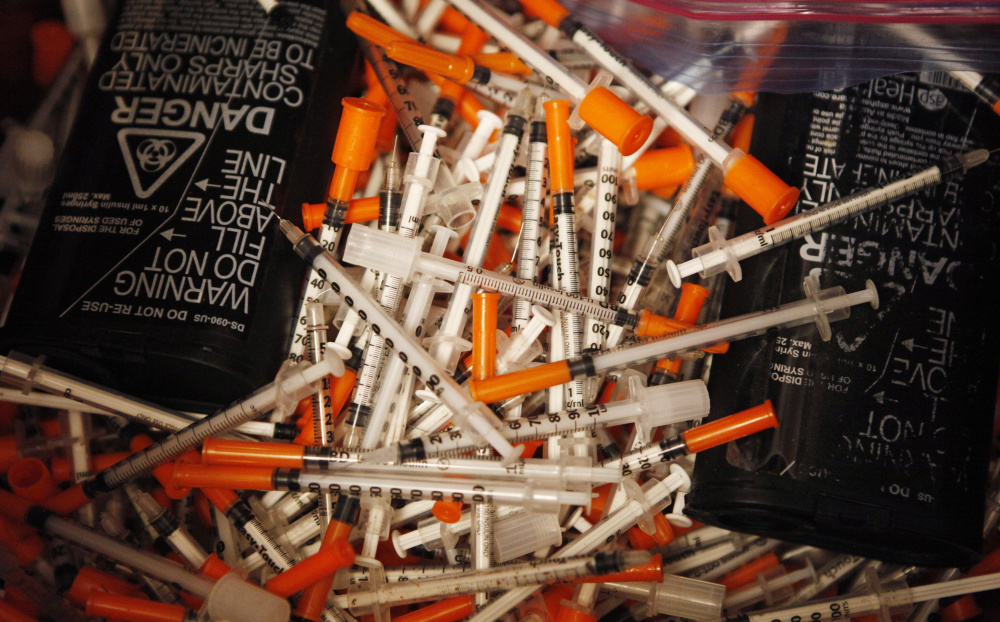AUGUSTA — Drug treatment and public health advocates said Thursday that a bill to provide $75,000 in state funding to needle exchange programs would help thwart the spread of disease driven by heroin use, including a recent spike in hepatitis C cases.
The bill is one of several introduced this legislative session in response to a heroin crisis sweeping Maine and many other states. The bipartisan proposal provides modest funding to six existing exchange programs, which have relied on private donations that total a combined $35,000 a year. If it passes, the bipartisan bill would make Maine one of about a dozen states that provide public funding to exchange programs.
The proposal follows a recent move by Congress to end a prohibition on the use of federal money for needle exchange programs.
While critics often argue that the programs encourage illicit drug use, public health advocates and exchange directors repeatedly rejected that argument during a public hearing Thursday before the Legislature’s Health and Human Services Committee. Several cited an unprecedented HIV outbreak in Austin, Indiana, where a community with a population of 4,200 recorded a higher incidence rate of HIV than countries in sub-Saharan Africa, according to the U.S. Centers for Disease Control and Prevention. The outbreak prompted Indiana to lift its ban on exchange programs in March 2015.
Rep. Karen Vachon, R-Scarborough, the lead sponsor of L.D. 1552, said the state needs to help fund the exchanges to stem an increase in acute hepatitis C cases, which more than tripled from nine in 2013 to 31 the next year, according to the Maine Center for Disease Control and Prevention. Sixty-eight percent of the cases were related to the injection of illegal drugs, according to the Maine CDC.
Vachon said the exchanges are another front in the battle against heroin.
“You solve a problem here, and another pops up over there,” she said.
Currently, two private organizations exclusively fund six exchange programs operated by four nonprofit groups. Exchanges in Portland and Bangor – the state’s two largest programs – have each reported that they spend about $30,000 on supplies. Vachon said an exchange in Lewiston has changed ownership twice in four years because of financial concerns.
Kenney Miller, director of the Maine Harm Reduction Alliance, said exchange programs are constantly on the “verge of collapse” and that the number of hepatitis C cases is likely underreported.
Miller said exchange programs are primarily geared toward preventing hepatitis C and HIV. But, he said, they also serve as an opportunity to educate consumers about drug overdose prevention and, at times, to distribute naloxone, a drug that can reverse the effects of heroin and other opioid overdoses. Other program directors said the exchanges also refer addicts to treatment programs.
Caroline Teschke, director of Portland’s Public Health Clinic, said the city’s program has 900 enrollees and exchanged over 145,000 needles in 2015.
“Without this service these needles might have been shared, reused or disposed of in any number of public places where they would have put many people at potential risk of serious infection or injury,” Teschke said.
She acknowledged that exchange programs can be controversial. She tried to make an economic argument for those “who are conflicted about doing something nice for drug users,” noting that a clean needle costs about 10 cents, while one case of HIV could cost more than $370,000.
Nearly all who testified Thursday supported L.D. 1552. But the Department of Health and Human Services testified against the bill based on a technicality. Kenneth Albert, director and chief operating officer of the Maine CDC, said the agency supports the intent of the bill, but wants to ensure that the funding it provides would go through the state’s procurement process to “ensure a fair and competitive process when allocating funds” to qualified providers.
The federal funding prohibition for needle exchange programs was first instituted in 1988. It was lifted in 2009 and reinstated in 2011.
The fitful funding flow highlights the dispute over needle exchanges. Proponents argue that the programs help prevent the spread of disease among drug users, but opponents have typically argued that needle exchanges encourage drug use. While scientific studies about the latter theory are inconclusive, it maintains some resonance with the public.
Even Congress’ action to lift the funding ban reflects the sentiment among some that exchange programs only facilitate drug use. The bill that reinstated funding for needle programs provides funding only for staff, counseling and treatment, not for the needles themselves.
Albert, citing that portion of the federal law, said supporters of the state bill should amend it to specifically allow state funds to apply to the purchase of needles.
The ambivalence over exchange programs is present at the state level, too. Some states don’t allow them.
According to the North American Syringe Exchange Network, there were 194 exchange programs in 33 states in 2014, and 12 states provided public funds. The network also found that the federal ban had put pressure on states and municipalities to fund the exchange programs.
The Health and Human Services Committee has not yet scheduled a work session for L.D. 1552. The committee will vote on the proposal before it’s sent to the full Legislature.
Send questions/comments to the editors.



Success. Please wait for the page to reload. If the page does not reload within 5 seconds, please refresh the page.
Enter your email and password to access comments.
Hi, to comment on stories you must . This profile is in addition to your subscription and website login.
Already have a commenting profile? .
Invalid username/password.
Please check your email to confirm and complete your registration.
Only subscribers are eligible to post comments. Please subscribe or login first for digital access. Here’s why.
Use the form below to reset your password. When you've submitted your account email, we will send an email with a reset code.